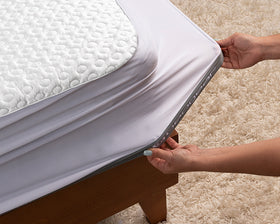888-996-9890

What's Your Sleep Position?
Side, Stomach, Back- What You Should Know About Your Sleep Style
How are you most comfortable? Is getting or staying comfy an issue? You might need to adjust your sleep position or change it altogether. Our lives change and our bodies change right along with it. As we get older or deal with life’s surprises, colds, pregnancy, injury, etc., we need to start sleeping smarter not harder. We need to adjust.
Poor Sleep Causes Problems
Flowing through complete, sleep cycles are crucial for our health, especially REM sleep which affects our memory. Improving your room setting and trying an adjustable can assist you to enjoy a restful night, but altering or optimizing your sleep position can too.
Headaches, body aches, lack of focus, stomach and immune issues. They can all result from inadequate sleep, and the long-term effects of sleep deprivation are serious. Here are a few problems related to regular low-quality sleep:
- Poor skin health and increased signs of aging
- Memory loss
- Impaired sex drive
- Elevated risk of heart disease
- Elevated probability of cancer
So, no matter how you can get it, get the rest you need.
But when you’re looking for ways to improve your sleep, try studying your position. Humans sleep in a variety of shapes, flat on your back, on your belly like you literally just fell into bed, curled up on your side so tight you’re half your normal size. Some of these positions can be a bit better than others, but you can up the anty on your sleep position with a few tricks.
Some Sleeping Positions Are Better Than Others
No matter your style, each position has pros and cons, but if you sleep the best in a position that seems to defy gravity, that’s probably still the best choice for you. Whatever gets you the best rest. To ensure you’re getting what you need, we can help you find the balance between comfort and practicality that’ll ensure restful sleep doesn’t elude you.
Whether you’re up for completely changing the way you sleep or you want little tricks to improve your tried-and-true, we’ve got you covered.
Back Sleepers

Back sleepers go ahead and celebrate. This is frequently recommended as the best position for preventing aches and pains in the morning. Good job.
Back Sleeping Benefits
To encourage your spine to rest in its most natural position back sleeping is best. To top it off, your arms, shoulders, and legs won’t be trapped under the weight of your body or flailed about into a twisted position. Your skeleton will love you. Additionally, sleeping on your back makes it easier to adjust to an adjustable bed.
Back Sleeping Cons
Unfortunately, if you snore or have sleep apnea, back sleeping isn’t suggested. The soft tissues of the throat fall to the back and can make matters worse. For young adults, scientists noted that poor sleepers typically spent more time on their backs.
How to Make the Most of Sleeping on Your Back
If you do snore or have sleep apnea, you’ll probably need to find another position since both can lead to interrupted sleep. You can also use snoring aids like nasal strips and mouthpieces.
To really up the back sleeping game, get an adjustable with anti-snore. It’ll tilt the head of the bed up a little to help those soft tissues stay out of your way.
You’ll also want to get the ideal mattress for spinal alignment. We recommend firmer mattresses for back sleepers, and especially the Magnistretch. It will actually help your spine to decompress and if you have back pain this can help alleviate some of it by just sleeping in the bed for a few months.
Side Sleeping

Side sleepers are in the majority, with around 63-70% of all sleepers enjoying the side position. This includes various styles of side sleeping too, including fetal position, the Yearner, which is sleep with the arms outstretched, and the Log, which is exactly what it sounds like.
Side Sleeping Benefits
If you’re going to be snuggling, side sleeping is perfect. Plus, it can help with heartburn and blood flow, that is if you sleep on your left side. Thanks to the unique arrangement of our internal organs, left-side sleepers are going to be more comfy.
Side Sleeping Cons
The major complaint of side sleeping is waking up with your bottom arm numb. Also, shoulder pain, hip pain, and back pain can result if your spine, neck, and hips aren’t in the correct alignment.
You might also have some issues with pressure points. However, with a good mattress and various pillows, you can make it work.
How to Sleep on Your Side Like a Pro
Keeping your back straight will be the key, and a great mattress is going to make that possible. You’ll want a bed that supports you while being gentle on pressure points like your shoulders and hips. I recommend the Tempur line of mattresses as a very happy side sleeper.
You might also want to try to sleep with a pillow between your legs to align your hips and use a thicker pillow that aligns your neck better with your spine. There are several side-sleeper pillows available, like these, that can help.
With the proper pillow that provides good support for your neck and is the correct height to keep your spine aligned, you’ll also help prevent shoulder pain.
Fetal Position

As a variation of the side-sleeping position, cozying up into a tight little ball mostly holds the same benefits of sleeping on your side in general. However, arching your back too much can lead to aches and pains in the morning.
It’s best not to see just how small you can get and just enjoy a gentle curl. Otherwise, it’s a good choice that many enjoy. Plus, the pillow between your legs becomes even more comfortable because you can hug it too.
Stomach Sleeping

At the lowest percentage, stomach sleeping is not a common choice, and that may not be so bad. Sleeping on your stomach can cause pain and stress in your neck and spine. But it does have some perks.
Stomach-Sleeping Benefits
For snoring and sleep apnea, sleeping on your stomach can help. The comforting hug position can also help you feel cozy and supported. And when you feel really comfortable, you’re less likely to roll over several times throughout the night.
Stomach Sleeping Cons
Craning your neck to sleep on your stomach can lead to some serious stiffness in the morning and straightens your spine into an unnatural position, causing all kinds of lower back pain. Additionally, if you have a cold, an injury, or if you're pregnant, now your favorite sleeping position is strictly off limits.
How to Make the Most of Stomach Sleeping
If sleeping on your stomach really is the best way you can get a quality night’s rest, then here are a few ways to make it more comfortable:
- Try sleeping with a very thin pillow or none at all
- Instead take that thicker pillow and stick it under your hips to add some curve to your spine
- Make morning stretches a part of your routine to prevent back pain
Tips for Transitioning to a New Sleep Position
If you are thinking about changing your sleep position, it will take time. It is a big challenge to change a habit, let alone a habit you’re doing while you’re asleep. Things may get worse before they get better when you’re switching things up.
To shorten the transition period and make the process a bit easier you can try:
- Blocking out natural light in your room and turn off all electronics two hours before bed.
- Sleeping on the other side of the bed. Your body might be a bit less likely to revert back to the old position.
- Make your bed extra comfortable. Get the best mattress for your style, get the right pillow, and upgrade your sheets.
If your goal is to improve your quality of sleep, the hard work will be well worth the effort. You can find the Benefits of a Firm Mattress and a Plush Mattress and additional sleep tips here.
If you have any questions, we’re happy to help. Just give us a call or email us at info@bedplanet.com, or visit our Las Vegas bed store located on Durango.






